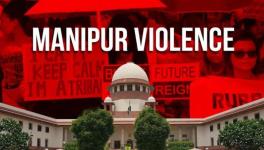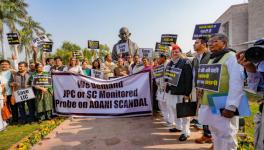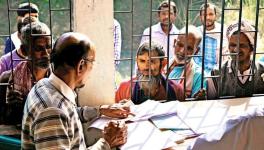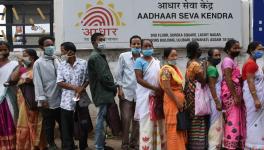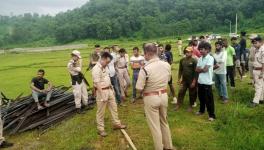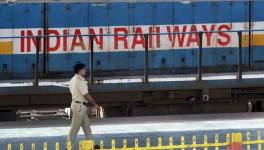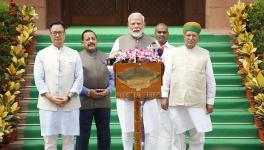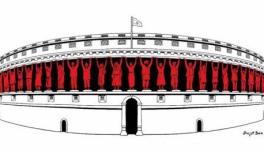Bodo Peace Accord: Is BJP Playing Divide-and-Rule ?
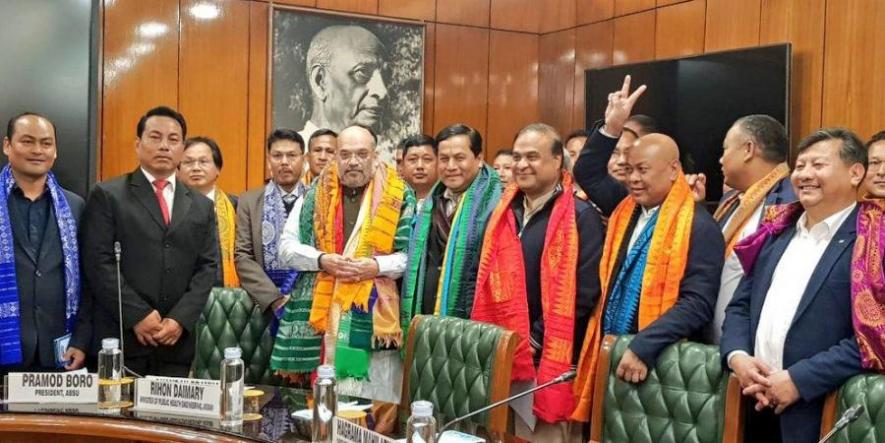
Image for representational use only.Image Courtesy : New Indian Express
Because truth is always multidimensional, politicians often show people the dimension of truth they may benefit from. So, when Prime Minister Narendra Modi himself showed up on February 7 in Assam's Kokrajhar to address one of the biggest events the state has ever witnessed, following a 'historic' Bodo Peace Treaty, nobody said "No CAA", and he caught the chopper to Bodoland right before the crucial Delhi elections day. Why — many may ask. The answer is, well, a complex and multidimensional one.
However they call the 2020 Bodo Peace Treaty signed on January 27 a 'historic' one, already there have been two treaties since 1993. The first and the second were indeed historic — as the first one gave the Bodos of Assam autonomy, and the second empowered the Bodos with an autonomous administrative unit in 2003.
But this time they just expanded the territory of that autonomous Bodoland Territorial Council (BTC), and yet when BTC Chief and ruling Bharatiya Janata Party (BJP) ally, Bodoland People's Front's (BPF) Chairperson Hagrama Mohilary, who has been on the throne of BTC since its beginning in 2003 till now, said it aloud during the February 7 rally that "BJP is going to win the coming (2021) polls", he certainly meant to help the BJP win.
Well, the interesting part is that when Mohilary was an insurgent in the early 2000s, it was the BJP-led Atal Bihari Vajpayee central government that made the second Bodo peace accord, when Mohilary shunned his insurgent surname Basumatary to transform and become the first BTC chief in 2003. He left behind his days in the jungles as the chief of the Bodoland Liberation Tigers Force (BLTF), an extremist Bodo group, to embrace a politician's life.
Another interesting story is that all the peace treaties have been signed with Bodos in their stronghold, ignoring the fact that there is a sizeable adivasi and Muslim population, among others, who have suffered the maximum in the many bloodbaths during the Bodoland movement since the 1990s.
There have been multiple massacres of both adivasis and Muslims living in the BTC zone, but not a single word did the PM utter, particularly for the Muslims, in his 52-minute speech while celebrating the 'Historic Bodo Peace Movement' on February 7, even though his speech was marked by the words such as 'peace', 'satya' (truth) and 'ahimsa' (non-violence). Mohilary, however, mentioned all communities living in the BTAD region, to be called BTR after this accord.
Now, there are several questions hanging around with the accord, and the most important one is: whether Muslims and adivasis actually feel safe enough following the new peace accord with Bodos, and has their plight at all improved during the 17 years of BPF regime in the BTAD areas (now to be expanded and called BTR–the Bodoland Territorial Region), with Mohilary on the throne?
Also, what happened to the demand for a separate Bodoland kicked off by the All Bodo Students' Union (ABSU) in the late 1980s?
More importantly, why was the accord signed right before the crucial BTC polls due in April 2020, and what benefits can BJP gain out of both this treaty with Bodos and the coming BTC polls — which are significant enough as they cover not only a sizeable territory of Assam but also a sizeable population and number of Assembly seats too?
Many are dubbing these polls as the semi-final to the state legislative Assembly polls due in 2021, especially when the ruling BJP has been cornered by the relentless anti-CAA (Citizenship Amendment Bill) movement pioneered by the people of Assam, which has erupted throughout India.
CURRENT POLITICAL SITUATION
Dwelling into the orbit of politics is a necessity as Prime Minister Modi, within the first two minutes of his speech during the February 7 peace accord celebration, himself said, "since the Independence, this has been the largest political rally".
Responding to a question whether the Bodo Peace Accord 2020 would bring peace in the conflict zone, noted Assamese journalist Haider Hussain summed up the current political scenario. He said: "To be frank, no Bodo peace accord has so far been able to satisfy all sections of even the Bodo society. There has already been a rift caused by this recent Bodo peace accord. The government itself is responsible for the all these rifts. They are projecting Pramod Boro now. Will Hagrama sit quiet and watch all this? So, there is and will be more rifts among the Bodo people, while some people, cashing on this chaos, will renew the demand for separate Bodoland state, at least for the sake of politics.”
Elaborating on the political impact of the accord, Hussain said: “This is all about the politics of convenience now. There may be some developments, there will be politics around the whole issue, but I hope the non-Bodos also will get some share of the development, because these days it is not possible to ignore the non-Bodos, especially after two parliamentary poll results. It has been proved by now that non-Bodos have become an election-deciding factor."
Interestingly, what Hussain said is actually happening on the ground. Mohilary, the incumbent BTC chief, within a fortnight of signing the accord himself, reportedly said the BTR accord was a failure as he and the surrendering National Democratic Front of Bodoland (NDFB) leaders had allegedly been kept in dark about the modalities of the accord by ABSU, specifically by Pramod Boro. He, however, refrained from blaming the government to give Boro an upper hand while attacking ABSU, saying former ABSU leader Boro had betrayed the community.
Boro, on the other side, reportedly said that by termig the accord a ‘failure’, Mohilary had "insulted the protesters and Bodo martyrs". Former Lok Sabha MP Sansuma Khunggur Bwiswmutiary has already reportedly termed the BTR accord "suicidal for the Bodos”. Bwiswmutiary also demanded scrapping of the CAA or "to introduce and implement the Inner Line Permit system (ILP) in the entire North-Eastern region, particularly in Assam, Tripura and Meghalaya".
ABSU, meanwhile, has reportedly officially suspended its separate Bodoland demand on February, albeit indefinitely for now.
However, the tussle is getting tougher in BTR, as the main opposition to the ruling BPF in the BTC, former Rajya Sabha MP Urkhao Gwra Brahma-led United People's Party Liberal (UPPL), is taking advantage of the situation now. As per a report published by Assamese daily Niyomiya Barta on February 16, Brahma expressed willingness to join the BJP-led coalition in Assam.
Brahma reportedly said, "The BTR accord has been made possible by the governments of Assam and the Centre. These days, the BJP is in power at both the Centre and state. So, for better implementation of the BTR accord, we will obviously seek BJP's patronage. We seek alliance with them, but it is purely BJP's discretion to decide on this."
The vernacular daily also reported that Assam BJP President Ranjit Das had already expressed willingness to take more regional leadership, including Pramod Boro, who resigned from ABSU leadership apparently to join politics on February 13, and parties besides BPF as coalition partners in the state.
Interestingly, Niyomiya Barta is reportedly part of a group of publications and TV channel, News Live, owned by powerful Assam minister Himanta Biswa Sarma's wife Riniki Bhuyan Sarma.
UPPL may get its deal from BJP before the BTC polls, as the ruling BPF is sure to face a strong anti-incumbency wave in the coming polls after its long 17-year-long stint as the ruling party of the BTC. People in hundreds are joining the UPPL, which made BPF chief Mohilary offer a Rajya Sabha seat to UPPL chief Brahma. The UPPL chief, however, declined the offer.
Given that ABSU reportedly supported Brahma during the 2019 Lok Sabha polls, rumors are also doing rounds that Boro may also join the UPPL.
The UPPL is currently organising a two-day party meeting at Bijni of Chirang district of BTR from February 20-21, where Boro is rumoured to join the party.
Boro, however, has kept his options open so far. Asked if he is joining politics soon, Boro told NewsClick on February 18, "I have been thinking on that. I have been in the movement for the last 30 years. So, I have some commitment to the society and some half-finished issues also. Recently we signed this accord on the Bodo issue. So, I will take time to answer this question on whether I will go independent or with a party. This is very hard decision for me at the moment".
Asked if he has any plans to fight in the coming BTC polls, Boro said, "If I join politics on behalf of any party, the party will decide who will be the chief candidate." However modest Boro sounds, it is clear from his response that he is likely to join politics and a party.
Meanwhile, the non-Bodos are also uniting, led by Kokrajhar MP Naba Kumar Sarania, who reportedly has termed the new Bodo accord as 'discriminatory'. According to Niyomiya Barta edition, dated February 18, non-Bodos have urged Indian Home Minister Amit Shah to hear their plea and that Himanta Biswa Sarma has reportedly assured them that he would arrange their meeting with Shah soon.
Although Sarania won the LS polls twice as an Independent in 2014 and 2019, respectively, mainly on basis of non-Bodo votes, especially against BJP ally, BPF, candidates such as Assam Social Welfare and Soil Conservation Minister Pramila Rani Brahma, his meeting with Shah apparently puts the BJP in an advantageous position, may political observers feel.
Amid these tussles and issues surrounding the BTR accord as well as the coming BTC polls, it seems the BJP may end up being the ultimate gainer.
BODO ACCORD ONLY FOR BJP'S POLITICAL GAIN: ADIVASIS
Talking to NewsClick, Stephen Lakra, president of the All Adivasi Students' Association of Assam (AASAA), accused BJP of reaping benefits from the BTR accord while dubbing it as a 'strategy' of the final Bodoland movement for a separate state.
Lakra said, "Before Modi’s arrived, Himanta Biswa Sarma was repeatedly saying, and it is also mentioned in the accord, that this accord is a comprehensive and final agreement. But we don’t agree, because we think this is part of the strategy for the final Bodoland movement.”
Citing earlier instances, Lakra said: “If you see the previous history, when they had their BAC accord, the first one, that time three ministers were there — Ram Vilas Paswan, Rajesh Pilot and another. Now Modi alone has come. That time, during the BAC pact, a large chunk of Congress ministers and the government was involved. Of course, they had such political power. That made the ground for a greater agitation. So, the first accord was the groundwork; it made the things ready for the agitation to become stronger and more organised. What I am implying is that this is a strategy of the Bodo leadership, especially ABSU. This BTR will not end the Bodo agitation."
Highlighting his criticism of the new Bodo accords, Lakra said: “This time, the accord is not comprehensive because it’s not inclusive. Without including all the communities, how can it bring peace and harmony? It was indeed a great opportunity for the BJP government for making peace… but it missed this opportunity.”
AS the development comes in the backdrop of growing resistance to CAA in Assam, the Adivasi leader smells a political and electoral rat.
“The agreement has been done only because now the anti-CAA movement is there, and mainstream Assamese voters are no longer with BJP. So, in order to make up for those seats, in order to get around 15 to 20 seats from the Bodo community, this preference has been given to them. So, this is only for BJP’s political mileage, for their benefit. When I say their benefit, it is vote bank politics.”
Cut up with the exclusion of non-Bodo groups, the Adivasi leader said: "We, too, want peace, want the problem of extremism to end. But the thing is that when they met for the agreement with Bodo extremists and ABSU and all Bodo leaders and organisations, the BJP played its divide-and-rule policy. They only talked with the Bodo leaders. When they avoided the other communities, we cannot say it is a comprehensive and inclusive pact. The BJP didn’t talk with adivasi leaders, the minority leaders, Rajbongshi leaders, or Nath Yogi leaders or any of the communities.”
Lakra alleged that what lay behind the signing of the new Bodo accord was nothing but BJP’s clear desire to hit at Assamese nationalism — “because Assamese nationalism is against RSS (Rashtriya Swayamsevak Sangh) ideology.”
“The people of Assam are not comfortable with the fact that BJP is guided by RSS ideology. So, BJP wants these sentiments to be divided. The BJP will face no loss if Assam is divided – it may be politically, ideologically or geographically.”
He cited how BJP had “successfully separating this part of the state with this accord,” adding that now the Bodo leadership would not go against CAA, and the BJP can say half of Assam is with them.
Clarifying once again that the adivasi community was not against the peace process, or against Bodos getting their rights, Lakra said: “All we wanted was to be included in the process of this agreement. We are unhappy about that."
Interestingly, the BJP government had appointed a former RAW ( Research & Analysis Wing) official A.B. Mathur as the interlocutor for not only the Bodo peace treaty, but also to deal with multiple extremist groups in the North East. Mathur’s name made headlines in 2009 when he superseded many of his colleagues to become additional secretary of the Indian spy wing leading to a protest strike.
WE HAVE NO EXPECTATIONS: MINORITY VOICES
The All Bodoland Minority Students’ Union (ABMSU) has similar feelings of non-inclusion and discrimination in the BTR agreement, as Muslims are one of the most affected communities by violence in the region ranging from 1990s to 2014. Millions of Muslims have lost lives and had to take shelter in relief camps.
Expressing anguish over the way the Bodo Peace Treaty was signed this time, ABMSU General Secretary Taison Hussain said: "Actually we have no expectation regarding this BTR or Bodo Peace Accord. This is not the first accord. In 1993, there was the BAC accord, and there have been many since then. Despite the fact non-Bodo people are almost 70% in the BTAD region, the governments have done multiple accords, just depending upon the demands of the Bodo organisations — they may be armed organisations, they may be students’ organisations.”
Hussain said till date, the government has not held a single meeting with non-Bodo organisations, especially ABMSU, while we have been fighting for our rights since 2005. ABMSU claims to represent around seven lakh religious minorities, including, Muslims, in the BTAD region.
“Since the beginning of the Bodo movement, Muslims have been killed, their houses burnt, they had to take shelter in Dhubri, Bongaigaon districts etc. But till now, not a single person has got any justice. If you go the field, you can see the condition of the roads, schools, hospitals, especially in religious minority areas. Only some roads that connect Bodo areas are a little developed in the zone.”
Stating that Muslims wanted peace the most in the BTAD area, Hussain said: “If peace comes permanently to the BTAD region, we will welcome this accord. If it stops illegal arms, if it stops violence, if it stops killings and kidnappings, we welcome this accord. But the government had not established any kind of talks with us before they signed this accord. So, we feel deprived and will be discriminated following the implementation of this accord as well.”
He lamented the fact that the was not a “single sentence indicating they are going to develop some colleges in minority areas, they are going to develop some bridges. Nothing! So, now that the accord has already happened, we are demanding a commission — which is going to be established under Chapter 14 of the Six Schedule — should have our representatives, at least one each from ABMSU, AKRSU and each every community."
Eventually, the big question that hangs is whether the Bodo Peace Accord 2020 will usher in a phase of development, peace and harmony — or is it just about 'the politics of convenience', as feared by Assamese scribe Haider Hussain fears.
The writer is an independent content management consultant based in Assam. The views are personal.
Get the latest reports & analysis with people's perspective on Protests, movements & deep analytical videos, discussions of the current affairs in your Telegram app. Subscribe to NewsClick's Telegram channel & get Real-Time updates on stories, as they get published on our website.









